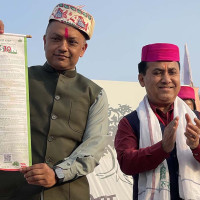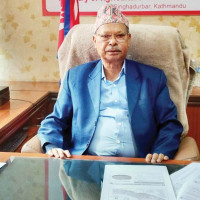- Thursday, 19 February 2026
Why Leaders Get Fed Up With Parties
Once, a well-wisher asked BP Koirala as to why he joined politics. Koirala replied: “I joined politics so that many people will participate in my funeral procession.” His answer was short and powerful, denoting that politics is entirely devoted to people's well-being and the nation's cause. BP’s idealism has, however, taken a backseat in reality. There are ample examples in which persons become disillusioned with the politics and the political parties with which s/he were associated for decades. They see their parties no longer stick to the idealistic values and principles they embraced in the early days of their inception.
There are notable figures who deserted the parties that they founded and spent their prime youth for their expansion during the oppressive environment and tumultuous moments of the nation’s political history. Reasons may be varied – internal conflict, ideological and personality clashes and differences in working style. But when the founding and senior leaders leave, the parties might be divested of their original mission and are bound to undergo several modifications to suit political expediency.
Authoritarian behaviour
For instance, Ganesh Man Singh and Krishna Prasad Bhattarai, both known as lauha purush (ironman) and santa neta (saint leader) respectively, abandoned the Nepali Congress in their final years of life. Bhattarai was a founding member and president of the NC, while Ganesh Man Singh was the party’s respected leader and commander of the People’s Movement of 2046 B.S. Inside the party, both the leaders fought the authoritarian behaviour of another NC leader, Girija Prasad Koirala. Fed up with Koirala’s domineering attitude, Ganesh Man eventually decided to desert it.
On the other hand, Bhattarai did not agree with the party’s adoption of a republican and secular line and preferred to remain outside the party. Many NC stalwarts who have been sidelined in the party consider that the oldest democratic party continues to lose its ideological compass after the exit of its political lodestars that guided and saved it through thick and thin. As the party becomes detached from the stated goals and ethical norms, it also fails to transform the nation and steer it through the cycle of instability and economic crisis.
This trend is also seen in Nepali left parties. Many of the senior and founding leaders of CPN-UML have separated from or revolted against its own leadership over the years. CP Mainali, R. K. Mainali, Madhav Kumar Nepal, Bhim Rawal and Ghanshyam Bhusal are not with the UML at the moment. Mainali brothers and Nepal were among the founding members of the then CPN-Marxist-Leninist (ML), the predecessor of the present UML. CP Mainali now heads the reconstituted CPN-ML, while Nepal is chairman of CPN-Unified Socialist, which he formed after revolting against the UML.
What is interesting is former UML vice-chair Rawal’s refusal to be a part of any communist party after being expelled from the UML. He locked horns with UML chair KP Sharma Oli over an array of issues before his expulsion from the party with which he had been associated for more than four decades. He has launched a ‘Motherland Awakening Campaign, Nepal’ to coalesce all patriotic, leftist and liberal democratic forces for the broader interest of the country.
Instead of projecting himself as a communist leader, Rawal chose to be a nationalist. This indeed raises a question: Did he stop believing that communists would no longer spearhead the nationalist campaign in the country? The Nepali communist movement rose on the platform of anti-feudalism and anti-imperialism. But Rawal’s decline to be a Red leader implies his frustration with Nepali communist leaders and their capacity to emancipate the oppressed classes from all forms of exploitation.
What is more shocking is the ichchhapatra (letter of intention) bequeathed by late Pradeep Nepal, one of the founders of CPN-ML. Nepal, who passed away in the first week of this month, left his will in which he requested that his cremation would be conducted like an ordinary citizen and no condolence meeting be organised in his commemoration. “I kept my freedom intact throughout life. I wish to die as a free man,” he mentions in his wish letter. His body was not lain in state at the party’s office. Neither was his body draped with the national flag. Nepal was a hardcore communist throughout his life but it sounds strange that he did not wish to get his body wrapped with the party flag upon his demise. So what was the meaning of his unwillingness to be recognised as a Red warrior?
Power game
Nepal was disappointed with the party leadership after it failed to pay much attention to his declining health. He suffered from multiple health complications, including Parkinson's. Soaring medical costs always frightened him and he sought support – direct and indirect – from the party. The party leadership that had indulged in a power struggle turned a blind eye to his woe. This may be a reason why he detached himself from the party for which he sweated and sacrificed.
The leaders' disillusionment with their parties suggests that their values and beliefs do not align with the latter. Jilted leaders live with their shattered faith after severing ties with the parties. The ideological, psychological and moral elements lie behind this. At the macro level, this is an indication of erosion of normative values of the parties, with bitter consequences for the nation's overall development. The ordinary people are often dictated by survival imperatives and the country reels from poverty and backwardness.
(The author is Deputy Executive Editor of this daily.)









-original-thumb.jpg)






